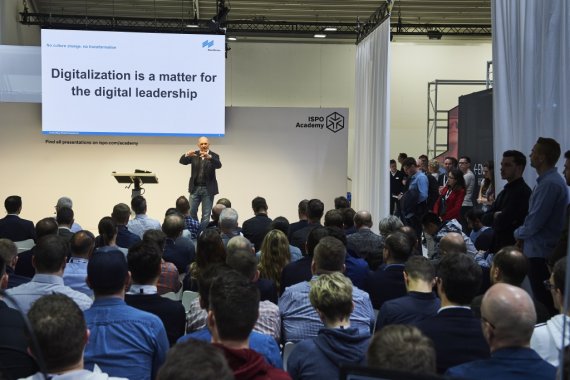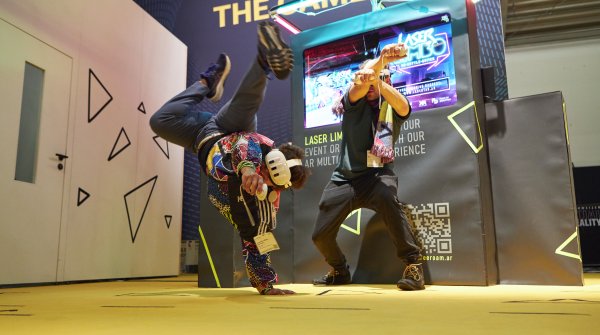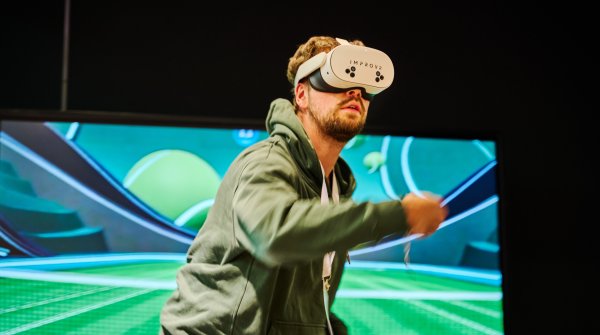
The official starting signal for the new format ISPO Digitize was sounded in late January ISPO Munich, only a few months later the first Summit for the digitalization of the sports business is imminent. Messe München obviously hit a nerve of the times: Adidas returned to the world's largest trade fair for the sports industry for the first time since 2006 as an exhibitor on the Digitize stand. Now, on 28/29 June, the industry will meet at the ICM at ISPO Digitize to discuss the opportunities and requirements of the transformation.
"With ISPO Digitize we have set the right signals for the sporting goods industry and for the specialist sports trade. The positive opportunities offered by digitalisation must be used to attract more people to sport," says Klaus Dittrich, Chairman of the Board of Management of Messe München.
One of the absolute luminaries in the field of digitalization is tech guru Robert Scoble. The visionary from Silicon Valley has been dealing with the people of the future for years. Scoble says: "Machines can improve people in almost everything." In his keynote at the ISPO Digitize Summit, he reveals exactly what he means by this.
Futurologist Professor Bernd Thomsen gives the sports industry a bad report of digitalization. He says: "The sports industry is in its infancy." There is no discernible plan
Günter Althaus, CEO of the ANWR Group, in which around 5500 European companies are integrated (including the affiliated dealers of Sport 2000), shares Thomsen's opinion. He believes that a suitable digital strategy is in short supply at the present time. "Digitalization must be concrete, not abstract," explains Althaus.
Roland Auschel, member of the Adidas Executive Board, dealt with digitalization at an early stage and pushed the company forward. In an interview with ISPO.com, he explains how Adidas is leading the digital transformation with examples such as the Speedfactory and the new Futurecraft 4D. On the other hand, he reveals whether Adidas still needs its own stores due to digitalization.
He demands of his partners and competitors: "The sporting goods industry must wake up and face up to digitalisation. How Virtual Reality can help? He told ISPO.com that too.
With its committed digital strategy, Adidas intends to overthrow industry leader Nike over the next few years. Adidas is in "full execution mode", says CEO Kasper Rorsted. This plan should succeed with new important strategic points. You can find out what these are here.
"He who thinks outdated fails." With this thesis the Chief Digital Officer of Telekom, Nils Stamm, comes to ISPO Digitize. Employees must develop a digital mindset. This is the biggest and decisive challenge. How can companies help their employees and what distinguishes successful companies?
FC Bayern Hackdays, FC Bayern Digital, the Media Lab and millions of social media fans: The record German football champion FC Bayern Munich is investing a lot in digitalization. Nevertheless, media boss Stefan Mennerich speaks of an "eternal beta phase".
Philipp Roesch-Schlanderer stands for innovation in the fitness industry. The CEO of fitness studio eGym talks in an interview about how the sports industry has changed since 2011 and how sports companies can benefit from (mega) trends.
Ralf Scholz also wants to revolutionize the fitness industry: "Movement is the defining principle of life. Only we humans move less and less." With the new fitness project The Mirai he wants to change that.
Tobias Gröber, Head of ISPO Group, explains in an interview which opportunities digitalization offers, how hurdles are overcome and how both the sports trade and the sports industry benefit from ISPO Digitize.
The ISPO Digitize Summit will focus on cybersecurity and data protection. "This will become a really big issue with the new basic data protection regulation," explains Gröber. Particularly with this topic one would have discovered substantial lack with manufacturers and dealers. However, after the evaluation of the digital readiness check, more were found. Which one? He reveals that in an interview.
The retail sector in particular is facing a major challenge as a result of digitalization.
Competition from online retailing is forcing sporting goods retailers to rethink their business models. Heike Scholz, expert for retail and digitalization says that this can succeed, but is only possible if stationary retail becomes an experience.
Matthias Schulte, expert for digital trade, on the other hand, pleads for so-called no-line commerce.
Mobile payment is becoming increasingly important for the sports trade. It can even help the stationary sports retail trade to catch up with online trade. Jannis Riesz, Vice President of Wirecard Labs, explains which digital payment options exist and how they can be implemented for retailers.
ISPO Digitize at the ISPO Munich 2018 in pictures
Purely pragmatic, functional design is a dead end especially today. Sports fashion designers are facing great challenges as a result of digitalization, says fashion expert Nora Kühner. Are they even being replaced by digital technologies?
"B2B e-commerce is still in the Stone Age," says Tim Böker of the Essen-based digital agency Kommerz. The digitalization of the processes is an enormously important step in simplifying ordering processes between retailers and manufacturers. Find out here about the advantages of digitalization in the B2B sector.
However, many retailers are also annoyed about the cooperation with the manufacturers. Which problems the shop owners see concretely, they betrayed in an ISPO.com dealer inquiry.
Digitalization covers the entire value chain in the (sports) textile industry. There is great potential for digitalization in sourcing, i.e. in textile procurement, in the interaction between retailers and manufacturers. Foursource have created a matching platform to help both sides.
Digitizing the supply chain is about constant availability of goods and a smooth process - from ordering to payment. "Today, the supply chain is still highly analog in many areas and is dominated by shortage management." This is the verdict of Joachim Kiegele, owner of the Intersport store in Geisenheim.
Digitalization can make marketing much more target group-oriented, efficient and effective. Max Hofbauer, CEO of Bergzeit, explains what is important for the marketing mix of the future.
Many major brands are already trying to reach their customers via social media. However, according to marketing expert Sascha Liebhardt, there is still a lot of fine-tuning to do - even with the big brands. What one should consider with Social Media marketing, the expert explained here:
 SportsTechVR training: the game changer for athletes?
SportsTechVR training: the game changer for athletes? SportsTechSport meets AI: gamification and more
SportsTechSport meets AI: gamification and more
- Awards
- Mountain sports
- Bike
- Fitness
- Health
- ISPO Munich
- Running
- Brands
- Sustainability
- Olympia
- OutDoor
- Promotion
- Sports Business
- Textrends
- Triathlon
- Water sports
- Winter sports
- eSports
- SportsTech
- OutDoor by ISPO
- Heroes
- Transformation
- Sport Fashion
- Urban Culture
- Challenges of a CEO
- Trade fairs
- Sports
- Find the Balance
- Product reviews
- Newsletter Exclusive Area
- Magazine



































